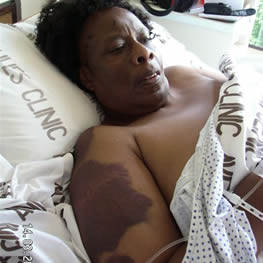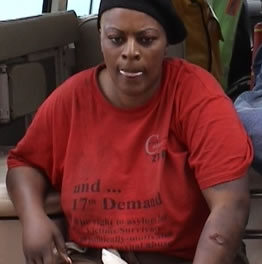We are starving. We will eat your tear gas.
Wednesday, March 21st, 2007 by Bev ClarkThe title of this blog is what activists from the Zimbabwe chapter of the International Socialist Organisation (ISO) said recently.
The police in Zimbabwe often use tear gas to break up demonstrations so I thought I’d give a bit of information on how to deal with “tiger” on the streets.
Breathing in tear gas, or getting it in your eyes, is not fun. This, obviously, is the whole point. But there are things you can do to mitigate the effectiveness of tear gas, and allow you to keep on fighting the good fight.
The first thing to remember about tear gas is that it is primarily a fear weapon. Yes, the gas hurts. But the fear caused by tear gas grenades is a much more effective means of crowd dispersal than the gas itself. So rule number one is to calm down.
Tear gas is most often delivered to its target in the form of grenades. These fit onto the end of gas guns and are fired with blank shotgun cartridges. So, when tear gas is being used you will hear gunshots. Don’t worry: you’re not being shot at.
After you hear a shot, look up. The grenade will be arcing toward its destination trailing white smoke. The grendade will explode. This usually happens while it is in the air, but not always. Again, this can be scary until you get used to it. After the explosion, a small gas emitter remains. It is metal and will be hissing and spewing out tear gas.
The wind is your friend. Move upwind of the gas. This will blow the majority of the gas away from you. Do not panic. Do not run. Panic is precisely what the police are trying to create.
Go to a protest or demonstration with a scarf to protect your face. It will allow you to breathe long enough to escape the gas. It is useful to have soaked your scarf in vinegar. Cider vinegar is less harsh-smelling and is recommended. Breathing in vinegar is not pleasant, but compared to tear gas it’s like fresh air. Unfortunately, the vinegar’s protective effect does not last long (minutes), and your scarf will be saturated with gas afterward. So bring several. Retying a gassy scarf around your face is not a good idea. Make sure the scarf fits tightly around your nose and mouth. You could also wear goggles. Goggles which are air tight. It is one thing to have severe upper respiratory pain. It is another to have that and also have burning, watering eyes.
DO NOT wear contact lenses to any event where there is even a possibility of tear gas usage. The contacts will trap the gas against your eyes which, aside from being painful, will eventually damage your cornea.
My description of what tear gas feels like is this: it feels as if the inside of your head is being dissolved by acid. There is a burning pain and a liquefying feeling as mucous, tears and saliva all begin flowing. Spit, blow your nose, rinse out your mouth, gargle. If necessary, do an eyewash by squirting water across your eye from the inside to the outside with your head tilted to the side.
Different people react differently to the gas. I’ve seen totally unprotected people go up against cops and gas for hours by sheer force of will. However, don’t expect that you will be able to. You may be pleasantly surprised, though.
Finally, diffuse tear gas lingers in the air for a long time. Expect eye, nose and throat irritation for several hours after tear gas has been used in an area, especially if the use of gas was extremely liberal.
Source: http://everything2.com/index.pl?node_id=1026851











